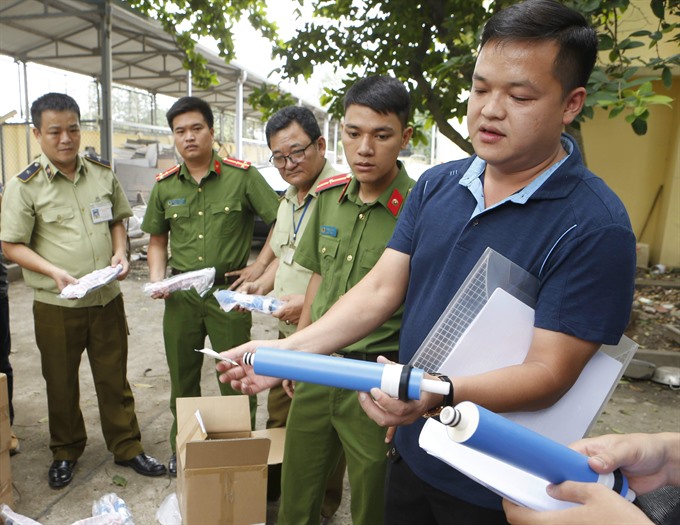 Society
Society

Market Watch forces nationwide detected more than 4,000 violations relating to smuggled, low quality or counterfeit goods, after examining around 4,350 cases in the first two weeks of April.
 |
| Hà Nội Police find over 800 fake water purifiers labeled DOW FILMTEC mid last year. Market Watch forces nationwide detected more than 4,000 violations relating to smuggled, low quality or counterfeit goods, after examining around 4,350 cases in the first two weeks of April. — VNA/VNS Photo Doãn Tuấn |
HÀ NỘI — Market Watch forces nationwide detected more than 4,000 violations relating to smuggled, low quality or counterfeit goods, after examining around 4,350 cases in the first two weeks of April.
Last year, Market Watch forces examined more than164,000 cases, of which they detected 103,100 violations. This number was just 2 per cent lower than that of 2016.
The numbers raised concerns amongst the public, especially recently-detected violations that related to cosmetic and medical products, which could have negative impacts on users.
On April 6, team No1 of the Hà Nội Market Watch Division found 19,000 tubes of toothpastes labeled Sensodyne and Colgate, and nearly 15,000 skincare products labeled Nivea at a storehouse in Đống Đa District.
The owner of the goods failed to show any legal documents to prove origin of the goods, which were worth about VNĐ1 billion (US$44,000).
A few days later, team No5 of the city Market Watch Division, alongside environmental police, found close to 2,000 eastern medicines with unknown origins in Hoàng Mai District.
On April 12 and 13, Market Watch forces in Hải Phòng seized about 1.5 tonnes of supplements in a cosmetic producing establishment in Kiến An District, as the owner failed to display legitimate paperwork for the products.
Fake cosmetic goods can be found easily in major markets such as Hôm Market, Đồng Xuân Market or Phùng Khoang Market in Hà Nội. They are usually sold at very low prices.
The fake products share common characteristics, including no official producer’s name, no listed ingredients, and no production/expiration date.
Vice Head of the Hà Nội Market Watch Division Nguyễn Công San said that cosmetic smugglers and fake cosmetic producers had tricks to pour their products onto market.
For example, to get permission to import foreign products, they first submit authentic samples. The first products to arrive in Việt Nam will be genuine. However, in following shipments, they will order their overseas partners to make cheaper and lower quality products, while using their existing permission to continue importing. San said that in other cases, domestic producers often falsified information.
Vice chief office secretariat of the National Committee on Anti-Smuggling, Counterfeit Goods and Products Trần Hùng told Kinh tế& Đô thị (Economic and Urban Affairs) newspaper that smuggled, fake, or substandard products could generate huge profits, while it was difficult to detect and punish violators.
A lack of legal framework and relaxed punishments are blamed for the flood of fake products into the market.
“The current punishments are not strict enough to deter violators,” Hùng said.
General Secretariat of the Việt Nam Anti-Counterfeit Products Association Đỗ Thanh Lam said that under current regulations, producers can sell their products once they have reported to the authorities that their goods are genuine. and do not contain banned substances.
“Despite the open mechanism, the lack of post-inspection facilitates the survival of fake products,” he said.
Lam said that joint efforts by anti-counterfeit product forces and local authorities were crucial in the fight against counterfeit goods.
He called for more effective measures to control product quality, for example, each product should be provided with a digital code so that users can track its origins.— VNS




